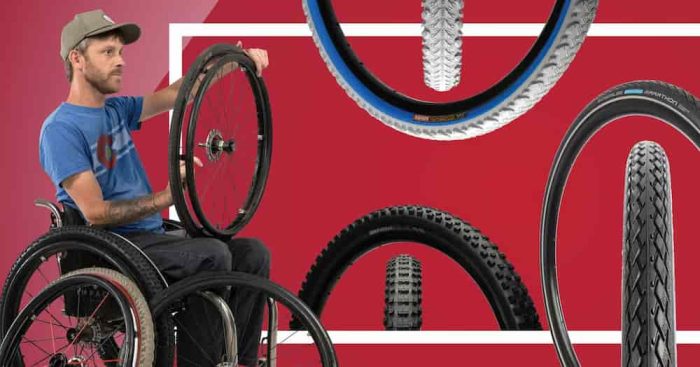Tires are an important part of a wheelchair, and they need to be in good condition for the chair to work properly. If your wheelchair tires are starting to wear down, it’s really important that you replace them as soon as possible.
In this article, we will take a look at the four most common types of wheelchair tires and help you decide which one is best for you. Plus, we will teach you how to buy them so you can get back on the move in no time!
Different Wheelchair Tires For Different Purposes
Since there are different types of wheelchairs, it is obvious that their tires will also be different in size, materials, prices, and more. Let’s check out each type and learn their uses.
Off Road Wheelchair Tires
Off road wheelchair tires are specially designed to provide a smooth ride over rough terrain. Most off road wheelchair tires are made from a tough rubber compound that can withstand the rigors of off-road travel. Some models also feature an aggressive tread pattern that helps to grip the ground and keep the wheelchair stable on uneven surfaces.
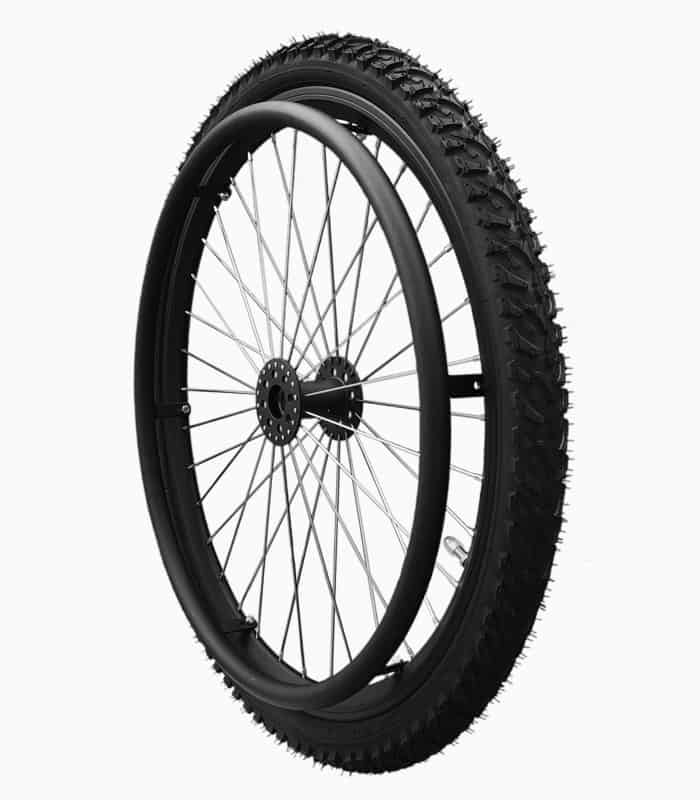
When choosing such wheelchair tires, it is important to consider the type of terrain that you will encounter regularly. For example, softer compounds are excellent for sandy or muddy conditions, while harder compounds can handle rocks and roots better. It is also important to consider the tire’s width, as wider tires can provide better stability on rough terrain.
All Terrain Wheelchair Tires
All terrain wheelchair tires are designed to provide users with a comfortable ride over various surfaces. The tires are typically made from rubber or latex, and they feature a tread pattern that is similar to that of a car or truck tire.
All terrain wheelchair tires are available in various sizes, and they can be inflated or deflated to adjust the ride height. These tires typically have a high load capacity, and you can use them on various surfaces, including pavement, dirt, sand, and grass.
Pneumatic Wheelchair Tires
Pneumatic wheelchair tires are air-filled tires that are most commonly used on power wheelchairs. These tires provide a smoother ride and more shock absorption than solid tires, making them ideal for users who spend a lot of time on their chair or who need to travel over rough terrain.
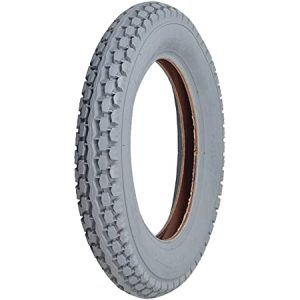
Pneumatic tires are also wider than solid tires, which can help to stabilize the chair and provide more traction. However, pneumatic tires can puncture more easily than solid tires, so it is important to check them regularly for any wear or damage. Pneumatic wheelchair tires are a great option for power wheelchair users who want a smooth ride and more shock absorption.
Anti-Puncture Tires
Anti-puncture tires are one of the most crucial wheelchair accessories and are designed to resist punctures and flats. This feature makes them ideal for wheelchair users traveling over rough terrain. These tires typically have a thick layer of Kevlar or another similarly tough material that helps to protect the inner tube from sharp objects.
In addition, anti-puncture tires often have reinforced sidewalls to further reduce the risk of flats. While they may be more expensive than traditional pneumatic tires, their added durability can make them well worth the investment.
Urethane
Urethane wheelchair tires are a type of tire made from solid urethane rubber. They are often used on wheelchairs because they provide many advantages over other types of tires. Urethane tires are more durable than rubber tires, meaning they will last longer and you will not have to replace them as often.
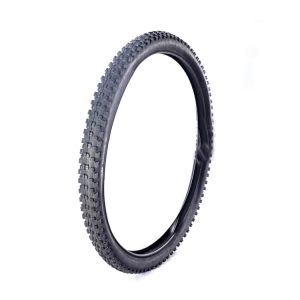
They are also smoother riding, providing a more comfortable experience for the user. In addition, urethane tires are less likely to puncture and easier to repair if they do sustain damage. As a result, they are an ideal option for wheelchair users who want a tire that will provide a smooth ride and lasting performance.
Solid Tires
Solid wheelchair tires are a great choice for users who want a low-maintenance option. These tires do not require much air, so there is no need to worry about flats. Solid tires are also less likely to puncture, making them a good choice for users worried about punctures. Moreover, these tires can be made of different materials, including rubber and polyurethane.
Rubber tires are the most common type of solid tire, and they offer a smooth ride and good traction. Polyurethane tires are more expensive than rubber tires but are lighter and offer better shock absorption. Overall, solid tires are a good choice for users who want a maintenance-free option that is less likely to puncture.
Foam Filled or Flat Free Inserts
These tires are filled with a special type of foam that helps to absorb shocks and reduce vibration. Foam-filled tires are also very lightweight, making them easier to push and maneuver. In addition, they provide good traction on both wet and dry surfaces.
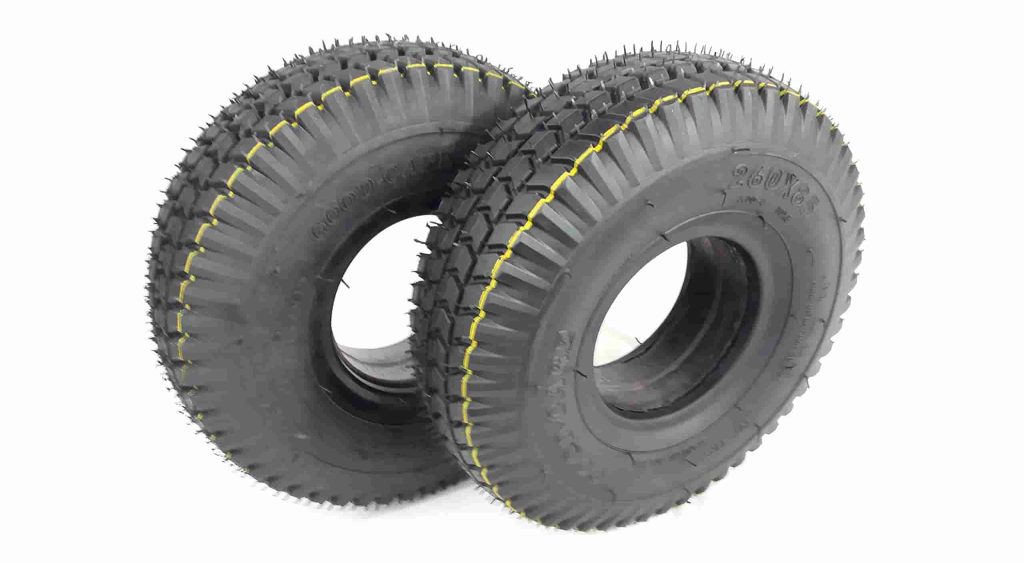
However, foam-filled tires can be more expensive than traditional solid tires and you may need to be replace them more frequently. Additionally, they may not be the best choice for users who spend a lot of time on rough or uneven terrain. But for most wheelchair users, foam-filled tires offer a comfortable and efficient ride.
Get The Best Wheelchair Tires | Buying Guide
When purchasing new wheelchair tires, there are a few key factors you will need to keep in mind to make the best decision for your needs. Here are 5 of the most important things to consider:
1. Type of Terrain
If you’re mostly going to be using your wheelchair on smooth, level surfaces, then you won’t need tires as robust as someone who plans on taking their wheelchair off-road or over rougher terrain. There are various tire types available on the market, so make sure to do your research and choose the right ones for your needs.
2. Climate you Live In
Different climates can have a big impact on the performance of your wheelchair tires. For example, if you live in an area with a lot of snow and ice, you will need tires that can provide good traction in those conditions.
On the other hand, if you live in a hot climate, you will want to ensure your tires can withstand the heat and won’t degrade too quickly. To make this process easier, you can type wheelchair tires near me on your phone and get the best picks near your area.
3. Weight
The weight of the person using the wheelchair is also an important factor to consider when choosing new tires. Heavier users will need stronger tires that can support their weight, while lighter users can get away with less robust tires.
4. Width of the Tire
The tire’s width is another thing to keep in mind, as a wider tire will provide more stability while a narrower tire will be easier to maneuver. Ultimately, the right width for you will depend on your personal preference and needs.
5. Price
Of course, price is always a factor to consider when making any purchase. When it comes to wheelchair tires, you’ll find a wide range in prices depending on the tire’s brand, type, and features. Do your research and compare prices before making your final decision.
Tips to Care for your Wheelchair Tires
Follow these tips, and you will extend the life of your wheelchair tires and enjoy many miles of smooth rolling.
- Check your wheelchair tires regularly for wear and tear.
- If you see any damage, replace the tire immediately.
- Keep your tires inflated to the proper pressure.
- Avoid overloading your wheelchair.
- Be careful when going over obstacles.
- Don’t store your wheelchair in direct sunlight or extreme heat.
- Protect your tires from sharp objects.
- If you must store your wheelchair for a longer time, remove the tires and store them separately.
- When traveling, be sure to pack extra tires and tools in case of a flat tire.
Some Last Words
Wheelchair tires come in all shapes and sizes, but the important thing is to find the right one for your needs. Hopefully, this article has helped you understand more about the different types of tires for your wheelchair available and how to buy them.
If you have any questions or need help finding the right tire for your wheelchair, please don’t hesitate to contact us. We would be happy to assist you in finding the perfect set of wheelchair tires for your needs.

